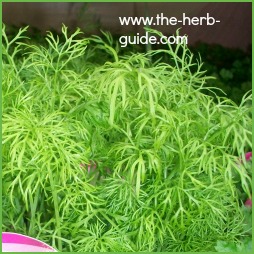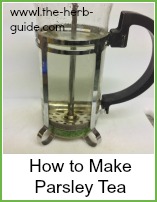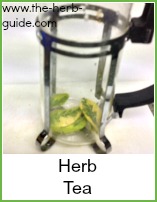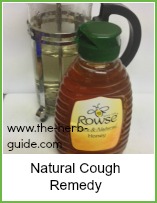- The Herb Guide Home
- Remedies
- Herbal Tea
Herbal Tea

Herbal tea can be very comforting.
What's the difference between tea or tisane.
There is no difference in the way they're made, a tea tends to be regarded as a refreshing drink and a tisane is commonly thought to be a remedy.

You can try a sample lesson to help you decide if the Herbal Academy of New England is the right choice for you - click the link below.
Preview Lesson from the Introductory Herbal CourseDon't worry about it - call it what you like :-) You'll enjoy it just the same.
It's easy to make herb teas.
For one cup, take the stems and/or leaves of the herbs, bruise them slightly by crushing them in your hands or roughly chopping them to begin the release of the beneficial properties and essential oils.
Pop them into a jug or pot - one of the 'plunger' type pots is a good idea as you can separate the leaf from the liquid and cover with boiling water. Or, have a look at the little infusers at the bottom of this page - they're really cute and would make a great gift with a bag or herbs.
If you don't have a lid, then pop a saucer on top to keep all the good properties from escaping in the steam.
Allow it to brew for about 10 minutes.
Strain into a cup and drink just as you would ordinary tea.
You use honey to sweeten it if you like and maybe float a slice of lemon on top.
If you’re using dried herbs, then 1 teaspoon per cup is enough, if fresh, then 1 tablespoon per cup will be needed. It's hard to judge, but a small handful of fresh leaves would be alright.
Herbal Tea Benefits
The benefits of herb tea are many, not least it is very refreshing to drink and soothing. But there are some that are particularly recommended as herbal remedies:-
Peppermint for an upset stomach or to aid digestion.
Chamomile to relieve stress.
Anise, Coriander or Dill for flatulence.
Fennel to ward off hunger pangs.
Parsley as a diuretic.
Bergamot to induce sleep.
Lemon Balm to release stress and headaches/migraine.
Marjoram against hayfever.
Thyme to relieve chesty coughs.
Valerian as an aid to good sleep.
This is not an exhaustive list, but gives a good idea of how beneficial herbal remedies can be.
If you are pregnant, then be cautious over taking herbs in anything other than culinary quantities.
The information on this website is in no way intended as medical advice and nor should it be taken as such.
If symptoms don't improve, consult your doctor.
If you have a medical condition, you must consult a Herbal Practitioner or a Medical Doctor.
If you are pregnant, you must consult your doctor or nurse before trying any herbal remedy.
If you are already taking pharmaceuticals, then speak to your doctor about taking herbs - some drugs react badly with herbs and you need to know that you are not going to do more harm than good.
There are some great reusable gizmos if you're making herbal tea. It's best to buy your own herb material or grow it yourself if you can.
That means you're going to have loose tea of course and bits floating on the top are an irritation. Herb tea is supposed to be relaxing!
So, one of these tea infusers or a special pot will save you the problems.
These other pages about herbal teas may be of interest to you
I may receive a commission if you purchase something mentioned in this post. See more details here This will not affect the amount you pay.





